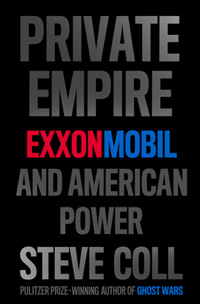Private Empire is an important contribution to the ongoing debate about our energy future. For his new book being released this week, Pulitzer Prize-winning journalist Steve Coll culled data from more than 400 interviews, numerous court cases, and government records to construct a series of engaging and informative snapshots of ExxonMobil, the largest and most profitable private oil company in the world.
Coll begins with the Exxon Valdez oil spill in 1989 and takes readers all the way up to the company’s announcement of record profits in 2011. He focuses on ExxonMobil’s efforts to manage political risks, and position itself for long-term profits, in challenging regions around the world. Included are the company’s efforts in war-torn Iraq, its attempts to enlist the cooperation of the World Bank to produce oil amid the poverty and political uncertainty in Chad, its struggles with the regime of Hugo Chavez in Venezuela, and its changing stance in the climate change debate in the United States.

Exxon’s lobbying for favorable government policies around the world is the heart of Coll’s work. Despite the volume’s title, the case studies included suggest that this profitable and powerful private company has lost as often as it has won in negotiations with sovereign nations.
But in full, the book’s 28 chapters consist of excellent magazine articles without much thread to hold them together. The closest thing to an overarching view of the company is provided by the recurring comments of Lee Raymond, the company’s president or chairman/CEO from 1987 to 2005. The straight-talking Raymond was one of the few top ExxonMobil executives interviewed on the record by Coll, and his distinctive and forcefully stated commitment to traditional American capitalism with limited government shapes much of the narrative.
Coll often uses Raymond’s quotes to represent ExxonMobil’s views and to set up critic’s counter arguments. Raymond strides through the narrative, a latter-day John D. Rockefeller, who more than a century ago established Standard Oil’s reputation as the best run but most hated oil company. (Before its dissolution by the U.S. Supreme Court in 1911, Rockefeller’s Standard Oil of New Jersey contained the companies that subsequently grew into Exxon and Mobil. Those two companies merged in 1998.)
Since the days of Rockefeller, American’s have feared the power of “Big Oil.” Many of its citizens are still concerned that concentrated economic power, especially in the oil industry, threatens to subvert American democracy through undue influence on public policy. In other parts of the world, the big international oil companies have been symbols of foreign control of economies, as well as symbols of political corruption. Coll’s data-rich case studies of oil-related political infighting in both the U.S. and oil-producing nations are the most important contribution of his book.
But the book’s major weakness is the lack of analysis of two linchpins of Exxon’s long-term success and power: Its near-obsession with financial controls, and its historical leadership in using new technology in ever-larger projects to find and produce oil and natural gas. These two factors have served as the company’s calling cards in negotiations with governments, and they deserve fuller treatment than Coll gives.
Anyone interested in oil, natural gas, and the global petroleum industry will profit from the information in Private Empire, but readers well-versed in the petroleum industry will come away wishing for more analysis of the book’s main themes. The author does not attempt to pull together the materials in the various case studies into a broad portrait of ExxonMobil’s strengths and weaknesses over time.
In the end, after more than 600 pages of detailed narrative, the book stops abruptly with a one-page conclusion briefly comparing ExxonMobil’s financial situation in 2012 with that of the U.S. government. Coll’s investigative reporting skills and his authoritative and engaging writing leave the reader wanting more discussion of the broader meaning of his hard-won data.





